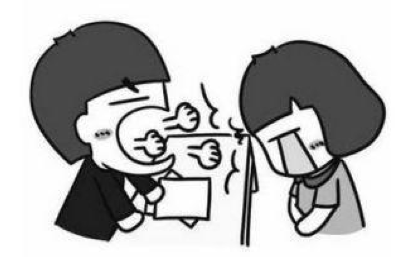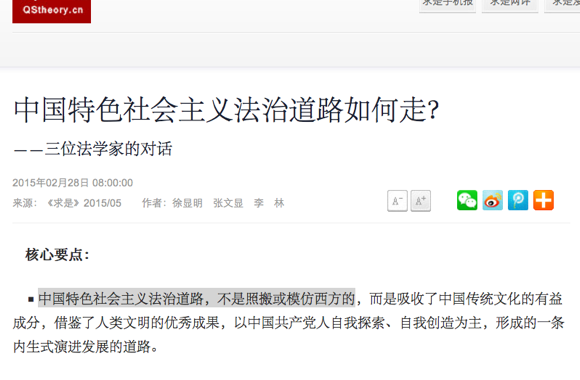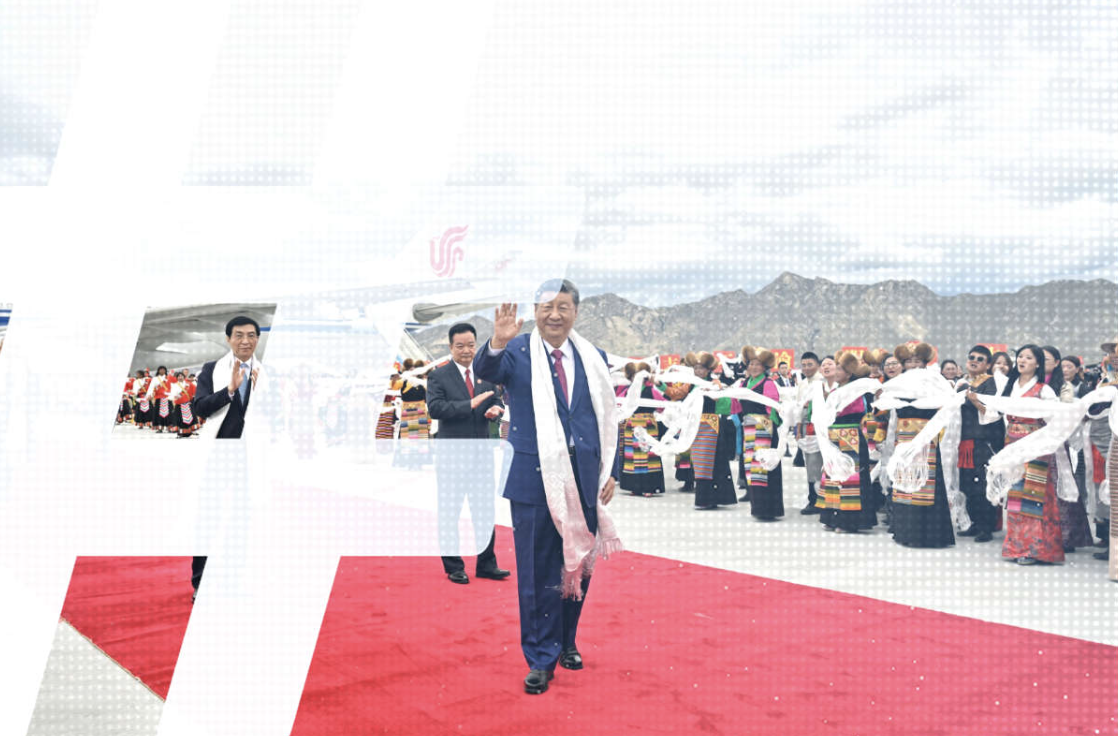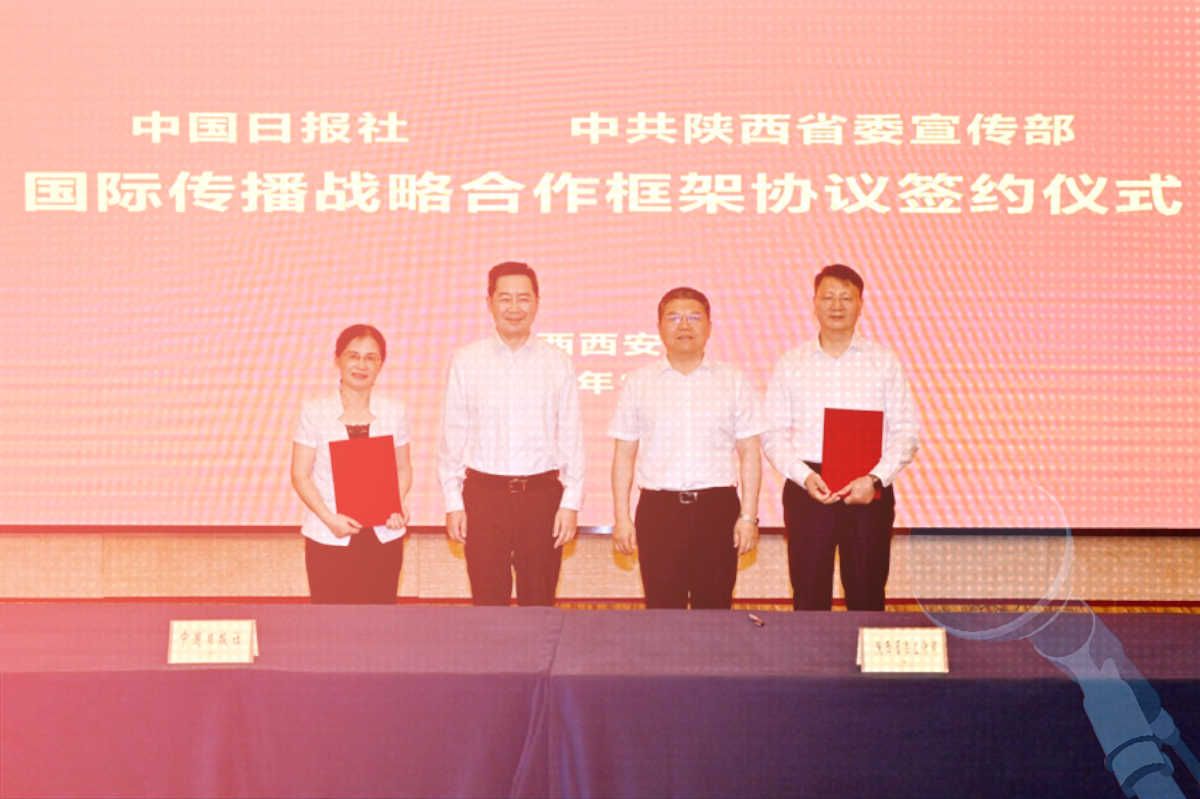In China’s state-run press of late, there seems to be a renewed (though certainly not new) animus against things Western. The ideas, language and culture of the West — even the foodstuffs of the West — pose a threat, we are told, to Chinese identities, paradigms and physical well-being. Back in February, the Beijing Daily, drawing on the remarks of Taiwanese writer and critic Yu Guangzhong (余光中), warned of a “language cancer” (语言癌) ravaging Chinese literacy, owing to a sustained pattern of “malignant Westernisation” (恶性西化).
Earlier this month, the official Xinhua News Agency cautioned about the dangerous things Westerners stuff into their mouths — which now, as Chinese grow wealthier and more adventurous in their tastes, apparently also pose a threat to more salubrious Chinese diets. “Westernisation of Diets Must Be Moderated: Bad Life Habits Cause 3 Major Cancers,” the Xinhua headline warned.

Most dangerous of all, however, are Western ideas. This has been a consistent theme in the mainstream Party press since the People’s Daily and others emerged from the October 2014 Plenum on “ruling the nation in accord with the law” with their ideological fists swinging, anxious to brawl out the differences between China’s “rule by law” (as some have chosen to call it) and Western rule of law.
On February 25, four days after the Beijing Daily piece on “language cancer,” officials from China’s Supreme People’s Court stressed again that a clear line must be drawn between “the legal system under socialism with Chinese characteristics” and “Western ‘judicial independence'” and “separation of powers.” Not mincing words, the officials said: “[We must] resolutely oppose the influence of erroneous trends of thought and mistaken ideas from the West.”
This year, the Westernisation of higher education has become a particular focus of strategic concern for Party officials. The warning flare was sent up in November last year, when an ostensible investigative feature in the Liaoning Daily decried insufficient “political recognition” among college instructors: “Some teachers are wont to share their superficial ‘impressions from overseas study,’ praising Western ‘separation of powers’ and believing that China should take the Western path. Openly, they question the major policy decisions of the CCP’s Central Committee, or even speak directly against them.”
On January 19, the Central Office of the Chinese Communist Party and China’s State Council jointly issued an “Opinion” on the country’s system of higher education, which it called “the front line of ideological work.” Universities, said the document, “bear the important task of studying, researching and propagating Marxism, fostering and praising socialist core values, and providing intellectual talent and support for the realization of the Chinese dream of the great rejuvenation of the Chinese people.”
The “Opinion” was followed with an announcement earlier this month by education minister Yuan Guiren that the government would conduct an investigation into the use of foreign textbooks at Chinese universities.
The call for ideological retrenchment in China’s universities has led to a deluge of pieces like this one, about the need to uphold socialist core values. Universities across the country are now reportedly following up with ham-fisted measures, including bans on the celebration by students of “Western festivals” (过洋节). “These debates,” said the People’s Daily of new measures like these and the controversy they engendered, “concern the question of how to understand and deal with Western values.” The paper continued:
There are elements within Western values that comport with human civilisational progress, and these deserve to be adopted. But fundamentally, [these values] are determined by Western capitalist modes of production, and at their core is the imperative of maximising the interests of the bourgeoisie. In an era of economic globalisation and social information, it is not at all strange that Western values have appeared in our universities. However, our universities are about fostering the builders and successors of the socialist project, and we cannot allow challenges from Western values to continue unchecked . . .
The debate over modernisation and national identity is of course as old as the hills in China. And it’s no surprise to see old terms being dusted off — terms like “wholesale Westernisation” (全盘西化) and “take-ism” (拿来主义).
The former term was introduced in the 1920s, advocated by prominent cultural figures such as the philosopher and essayist Hu Shi (胡适), who equated the process of adopting Western ideas with what he also called “wholehearted modernisation” (全力的现代化) or “complete modernisation” (充分的现代化), the idea being that China was hampered by its “feudal culture” (封建文化). The latter term, “take-ism,” introduced by the writer Lu Xun (鲁迅) in a 1934 essay of the same name, is in fact a more selective approach than the wholesale or wholehearted borrowing advocated by Hu Shi, the sociologist Chen Xujing (陈序经) and others in the period before and after the 1919 May Fourth Movement.
On February 28, in what seems to me to be a serious misreading of Lu Xun’s essay on “take-ism,” the Party’s flagship journal of theory, Qiushi (求是), warned against both “take-ism” and “wholesale Westernisation” as it discussed the unique path of rule of law under the rule of the Chinese Communist Party:
The path of rule of law under socialism with Chinese characteristics does not indiscriminately imitate or model itself on Western things, but adopts beneficial elements of traditional Chinese culture, and references the excellent fruits of human civilisation, creating a path that endogenously evolves, principally through the self-exploration and self-innovation of the Chinese Communist Party . . . The Chinese Communist Party does not spurn the fruits of all human civilisations and institutions. But study and referencing does not mean “take-ism”, and we must prioritise our own [needs], and usefulness for ourselves, carefully identifying [ideas and trends] and being reasonable in their absorption, and we certainly must not just copy them. Even less can we pursue a ‘wholesale Westernisation.’

Read through all of the recent bluster in Party media about the need to uphold “socialist core values” and cleave to “China’s unique path,” and I think you have, for better or worse, a prime example (a textbook example) of “take-ism.” By which I mean that the Chinese Communist Party has selectively adopted/adapted one Western “ism” with such alacrity that it can behave — without the least sense of irony — as though Karl Marx, a German, is the quintessence of Chinese thought and identity.
There are many textbook examples of oddly “take-ist” (Marxist) critiques on “take-ism”, but one of the best and most recent is a piece on economics education in China written by Qiu Haiping (邱海平), a professor at Renmin University of China. The piece, published in the Chinese Academy of Social Sciences Journal, bemoans the fact that the teaching of “political economy,” which in this case refers narrowly to Party-approved Marxist theory, has fallen by the wayside in China.
Qiu, himself an expert on Marx’ Das Kapital, paints a portrait of the progressive infiltration of Western economics and Western-trained economists in China’s universities. This has brought a shift and displacement of the “mainstream” in economics teaching, he says. That is important in particular because the word “mainstream,” in the context of the People’s Republic of China, refers generally to the ideas espoused by the Party and Party-controlled vehicles of media and culture.
Qiu’s piece is supremely dogmatic in its approach to economics education and its political goals. And yet one of chief reasons he gives for the need to control the trend of “severe Westernisation” is the risk of “dogmatism and atrophy” in economics education.
No more need be said. A translation of Qiu Haiping’s piece follows. Take it, or leave it.
“‘Westernized’ Economics Education Cannot Become the Mainstream” (“西化”的经济学教育不能成为主流)
Chinese Academy of Social Sciences Journal (中国社会科学报)
March 20, 2015
By Qiu Haiping (邱海平)
As early as the 1980s, even though a small number of universities created Western economics classes, all economics degree programs in our universities had classes on political economy — and the vast majority also had socialist economic theory and on Das Kapital. Banking and finance courses created at the time, and other courses incorporating economics, were also guided principally by Marxism and used texts written by scholars in our own country. In those days, therefore, Marxist political economy studies was “mainstream economics” in universities in our country.
Beginning in the 1990s, the study of Western economics began returning to most universities in China, and more and more classes were created. Among these were not just Principles of Economics, but also intermediate and high-level microeconomics courses, macroeconomics, econometrics, new institutional economics (新制度经济学) and other such classes.
At the same time, political economics studies (政治经济学课程) was removed from the curriculum at more and more universities, and at some schools even courses on Das Kapital were ceased. Under this environment, political economics studies instruction teams in our universities seriously atrophied. This is especially true today, when in the makeup of perhaps all university economics programs, political economy instructors are far outnumbered by instructors specialising in Western economics.
In terms of the subjects covered in economics programs, business, finance and other courses have all opted to use texts underpinned by Western economic theory. Clearly, Western economics has already become “mainstream economics” in our universities, and political economy has been severely marginalized.
While the economics curriculum in our universities has undergone immense change, a major shift has also occurred in standards for the selection of papers for professional economics journals, and the assessment of research work. In terms of the selection of papers, some specialised economics periodicals, particularly those with substantial influence, have published masses of professional writing using Western economics standards (including theories, methods and tools) in the name of “the modernisation of economics” . . . and “not publishing articles about political economy” has already become a “clear principal” followed by some professional economics periodicals. . .
In recent years, in order to raise the number of papers published overseas and the level of so-called “internationalisation,” many universities have spent enormous resources in a “competition movement” to attract students who have gotten their PhDs overseas, and the number of “returning” overseas PhDs and foreign instructors is rising continuously at some universities. Therefore, we must carry out practical research on the severe “Westernisation” of economics education and research. On the one hand, we must fully recognise the serious harm this trend might result in; on the other hand, we must recognise the different statuses and mutual relationship between political economy and Western economics, and we must have appropriate policies to guide and adjust them.
This serious “Westernisation” trend is harmful first of all because it causes indifference or even resistance to political economics and all Marxist thought, leading them to doubt socialism, deny the legitimacy and rationality of the leadership status of the [Chinese] Communist Party. Secondly, it leads young students to a blind faith in the Western capitalist system and in individualism. Third, it leads to the partial failure of political and ideological classes at institutions of higher learning in our country.
Fourth, it leads young students to dogmatism and atrophy in their ideas and thinking, and stands in the way of students grasping the scientific methods by which they can reach a correct understanding of history and society. Fifth, it is not advantageous to the renewal and development of the economic theory of socialism with Chinese characteristics. Sixth, the severe “Westernisation” of economics education generates severely “Westernised” economics research, which means alienation from the real needs of socialism with Chinese characteristics, resulting in formalism and inapplicable research and the wasting of inordinate research resources.
Seventh, the most fundamental harm caused by the severe trend of “Westernisation” of economics education in our country is that this sort of economics education does not benefit the fostering of the successors of socialism with Chinese characteristics. Therefore, the Party and the government must give serious priority to the trend and phenomenon of severe “Westernisation” in economics education in our country, and must take various firm measures to correct this problem.




















